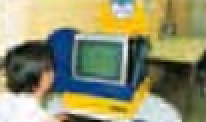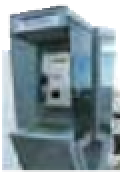Travel Reference
In-Depth Information
Left
Euro notes
Middle
Cyberposte internet terminal
Right
Public phone booth
Banking & Communications
Currency
Since January 2002,
the euro has been the
official currency in France.
Euro banknotes have
seven denominations: 5,
10, 20, 50, 100, 200 and
500. There are also eight
coin denominations: 1
and 2 euros, and 1, 2, 5,
10, 20 and 50 cents.
Travellers'
Cheques
Travellers' cheques can
be exchanged for cash in
banks, and are widely
accepted in retail outlets.
Choose a well-known
company like American
Express or Thomas Cook.
form: hand-shaking is
de
rigeur
when you are intro-
duced to someone, and
between acquaintances.
It is polite to acknowledge
people formally: “Bonjour,
madame/monsieur .
Telephones
With cards or euro
coins, you can make local
and international calls
from any public telephone
booth. Post offices also
have booths
(cabines)
;
you make your call and
pay afterwards. In some
public phones you can
only use
télécartes
-
phone debit cards - which
you can buy at post
offices, newsagents and
tabacs
. The
pays direct
service enables you to
call via an operator in
your own country, and
pay by debit or credit
card. To call France from
abroad, dial the relevant
international code
followed by 33, then the
number (omitting the
first zero).
Post Offices
French post offices,
identifiable by their yellow
and blue “La Poste” sign,
open 9am-noon and
2-5pm Monday to Friday,
and Saturday mornings.
You can buy stamps in
tabacs
(tobacconists), as
well as post offices.
Changing Money
You can exchange
foreign currency and
travellers' cheques for
euros at banks, bureaux
de change, American
Express offices, and
some post offices. Check
exchange rates before
you travel. In bureaux de
change, check that the
rate offered and the
commission charged are
reasonable. Avoid
changing money in hotels.
Fax and Poste
Restante
Faxes can be sent or
received at all post offices.
Main post offices will
hold mail addressed to
individuals on the move
until collected in person.
The envelope should
carry the recipient's
name (surname first), the
words “poste restante ,
and the address of the
post office, including the
five-digit postal code. The
person collecting the
mail needs to take ID
and pay a small fee.
ATMs
Most towns have
ATMs (automatic teller
machines) - a convenient
way of drawing cash
from your bank or credit
card account. Each one
indicates which cards it
accepts. Many function
in several languages.
Internet
Card-operated
internet terminals, called
Cyberposte, have been
installed in numerous
post offices throughout
France, providing the
cheapest way for
travellers to send and
collect e-mail; you can
buy the card over the
counter. If you don't
want to be restricted to
post office opening hours,
there is a growing number
of internet cafés in
Norman towns and cities.
Credit and Debit
Cards
Major cards are widely
accepted throughout
Normandy, and you should
have no difficulty paying
for most things - motor-
way tolls included - with
plastic. Smaller shops,
restaurants, hotels,
campsites and
gîte
operators prefer cash.
Language and
Etiquette
English is widely spoken
by people in the Channel
ports, cities and main
towns, but less so in
rural Normandy, where
you will need a grasp of
French to understand and
be understood. Meeting
and greeting is an art
123

















